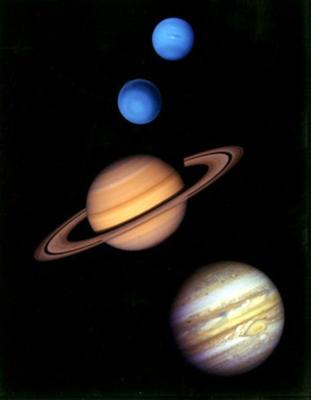The other planets
by Gary
(UK)
Well, if man is causing Global Warming what are all the other planets (Mars, Jupiter, Pluto etc.) doing warming up too? Starting soon the Sun will calm down for the next decade or so - I anticipate that once this happens the world will start to cool again.
Barry's Response - Gary, the other planets are keeping up with the Joneses, and we are Jones.
On a more serious note, physical patterns beyond our planet affect us just as much as anything mankind has done. As time goes on, these facts will become more obvious.
We compared two photos, one from 1977 and one from 1999. Two separate missions covered the whole surface of Mars. A darker surface in the second photo suggests reduced albedo, and dark patchy areas in the south.
Based on this and other evidence, Lori Fenton calculated that the planet's temperature had increased by more than half a degree centigrade in 22 years. The dust on Mars plays a big role in changing the climate there, according to further research. It's bigger than anything else.
Pluto's temperature has also been increasing. During the same time frame, Pluto has also been warming up, likely as a result of approaching perihelion in its wildly eccentric orbit.
Some have taken these observations out of context to deduce that they're all warming because of solar variation. With the limited data we have, it's hard to come to such a sweeping conclusion.
A bit more about the other planets
With all that behind us: As the Earth warms up, nearby planets' temperatures might change, but the extent of the change would depend on several factors.
The distance between Earth and the other planets is one factor to consider. The planets that are very close to Earth, like those in our solar system, could be affected by changes in the amount of solar radiation that reaches them as the Earth's atmosphere changes. The effect would be negligible if the planets were much farther away.
It's also important to consider the atmospheres of the other planets. Each planet's atmosphere reacts differently to solar radiation changes. It's possible that some planets have thicker atmospheres that can absorb more solar radiation, while others might have thinner atmospheres.
As the Earth warms, nearby planets may experience some changes in temperature, but the effect is likely to be small and would depend on a lot of factors.
Search this site for more information now.
Comments for The other planets
|
||
|
||
|
||
Do you have concerns about air pollution in your area??
Perhaps modelling air pollution will provide the answers to your question.
That is what I do on a full-time basis. Find out if it is necessary for your project.
Have your Say...
on the StuffintheAir facebook page
Other topics listed in these guides:
The Stuff-in-the-Air Site Map
And,
Thank you to my research and writing assistants, ChatGPT and WordTune, as well as Wombo and others for the images.
OpenAI's large-scale language generation model (and others provided by Google and Meta), helped generate this text. As soon as draft language is generated, the author reviews, edits, and revises it to their own liking and is responsible for the content.





